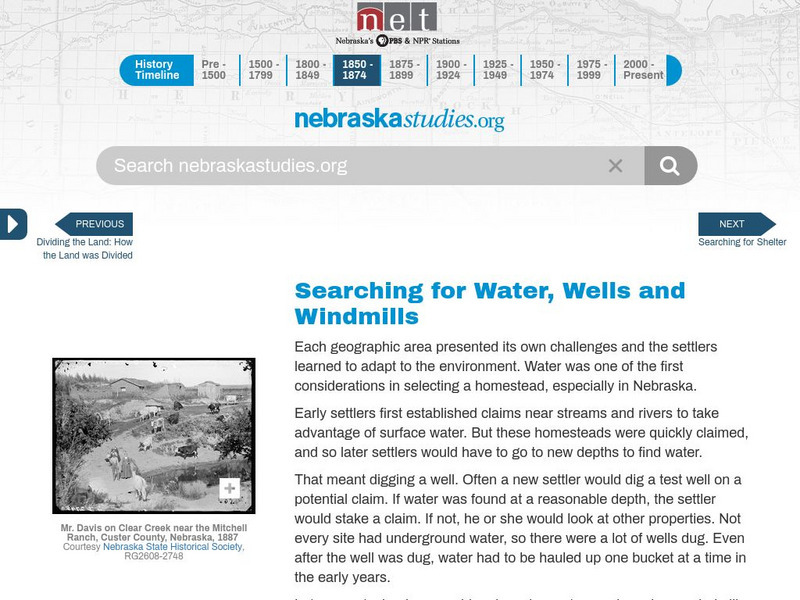Other
Arizona Sonora Desert Museum: The Hohokam
An informative article that describes many aspects of Hohokam culture. Read about their agricultural practices, the native plants they used for medicine and clothing, and the materials they used for building their houses. See examples of...
The British Museum
British Museum: Mesopotamia: Palaces of Assyria: Palace Without a Rival
This virtual exhibition describes the stages in the construction of Sennacherib's Palace Without a Rival and the surrounding gardens, with quotes from Sennacherib accompanying the text. Click on highlighted words for pop-up definitions,...
Andre Dollinger
Reshafim: Fruits and Vegetables
A description of the many fruits and vegetables available to the ancient Egyptians. A chart is provided showing which frits and vegetables were grown in which seasons.
Wessels Living History Farm
Wessels: Farming in the 1920s: 1920s World Events
Find a list of events in many categories that occurred in the 1920s.
CK-12 Foundation
Ck 12: Earth Science: Uses of Water Study Guide
[Free Registration/Login may be required to access all resource tools.] This study guide summarizes the key points about the uses of water. Includes a few questions to check for understanding.
Khan Academy
Khan Academy: Gallery: Civilization
Explore the images of this gallery and consider how increased productivity from the land, food surpluses, and swelling populations changed the types of communities that humans lived in.
Cosmo Learning
Cosmo Learning: Water Resources Engineering
A collection of video lectures from a course on water resources engineering. Webpage includes twenty-eight lectures from a professor at the National Programme on Technology Enhanced Learning. Lectures vary in length and cover topics like...
Nebraska Studies
Nebraska Studies: Homestead Act: Searching for Water: Windmills
A description of how watermills work and how they were used on the Great Plains.
Curated OER
Educational Technology Clearinghouse: Maps Etc: Arizona, 1904
A map of Arizona from 1904. "Arizona was organized as a territory in 1863. Area, 112,290 square miles; population, 122,212. Of these 26,480 are Indians. About one-third of the white population are foreign born. Chiefly a mining Territory...
Curated OER
Unesco: Iran: The Persian Garden
The property includes nine gardens in as many provinces. They exemplify the diversity of Persian garden designs that evolved and adapted to different climate conditions while retaining principles that have their roots in the times of...
Curated OER
Wikipedia: National Historic Landmarks in California: Old Mission Dam
The first major irrigation project on the Pacific coast, this dam supplied water for milling and irrigation at the Mission San Diego de Alcala, 5 miles away. Now part of Mission Trails Regional Park.
Curated OER
Unesco: Spain: Palmeral of Elche
The Palmeral of Elche, a landscape of groves of date palms, was formally laid out, with elaborate irrigation systems, at the time the Muslim city of Elche was erected, towards the end of the tenth century A.C., when much of the Iberian...
Curated OER
Unesco: Tajikistan: Proto Urban Site of Sarazm
Sarazm, which means "where the land begins", is an archaeological site bearing testimony to the development of human settlements in Central Asia, from the 4th millennium BCE to the end of the 3rd millennium BCE. The ruins demonstrate the...
Curated OER
Unesco: United Arab Emirates: Cultural Sites of Al Ain
The Cultural Sites of Al Ain (Hafit, Hili, Bidaa Bint Saud and Oases Areas) constitute a serial property that testifies to sedentary human occupation of a desert region since the Neolithic period with vestiges of many prehistoric...
Curated OER
Wikipedia: National Historic Landmarks in Texas: Espada Aqueduct
Built by Franciscan friars in 1731 to supply irrigation water to the lands near Mission San Francisco de la Espada.
Curated OER
Wikipedia: National Historic Landmarks in Nevada: Francis G. Newlands Home
This was the home of Francis G. Newlands from 1890 until his death in 1917, including his tenure in the House of Representatives and Senate. Newlands is known for the Reclamation Act of 1902, under which the U.S. government led the...
Wikimedia
Wikipedia: Terrace (Agriculture)
Terraces are constructed in agriculture to prevent the runoff of water. This site provides further details about terraces along with how they have been used in history.
ClassFlow
Class Flow: Water
[Free Registration/Login Required] In this lesson students identify water supplies and understand the importance of clean water and how it is used. The use of the atlas to find high rainfall/desert countries is incorporated in the lesson.
Other
Theodore Roosevelt Center: The Arid West the Newlands Reclamation Act of 1902
A brief look at Theodore Roosevelt's interest in opening up the West to settlement and agriculture by making water available through water reclamation projects.
Other popular searches
- Irrigation Mesopotamia
- Ancient Egyptian Irrigation
- Irrigation Sumer
- Basin Irrigation
- Early Irrigation
- Irrigation Systems
- Irrigation and Fertilizer
- Irrigation in Egypt
- Ancient Irrigation
- Drip Irrigation
- Irrigation Egypt
- Egypt and Irrigation






